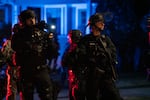An audit of the Portland Police Bureau’s intelligence gathering practices during the 2020 protests found officers collected information about political activity without providing evidence a crime had been committed.
The audit, conducted by the city auditor’s office, also found the Criminal Intelligence Unit did not limit access to their reports and kept them longer than they are supposed to.
“They need to have procedures and policies in place that acknowledge that this is a particular area of policing that is sensitive because it has the potential to step on people’s rights and stifle free speech,” Portland Auditor Mary Hull Caballero said in an interview with OPB.
The auditors reviewed 40 police reports related to racial justice protests and 33 Criminal Intelligence Unit reports. In five of the 40 police reports, auditors found officers collected personally identifiable information such as political, religious or social views without documenting criminal activity.

Police at protests in East Portland.
Jonathan Levinson / OPB
In one instance, an officer recorded protesters with his personal cellphone. The officer said the video was for his personal use. In other examples, officers took photos of protesters, video of organizers, recorded license plate information and saved photos and videos posted to social media without indicating any suspected criminal activity.
“The Bureau had no directives or instructions for officers specific to investigating criminal activity during (protests),” the audit report states. “Without guidance, officers used their individual discretion to decide how and what type of information to collect.”
In six instances, auditors found the Criminal Intelligence Unit kept information about demonstrators that had no “substantiated criminal activity” longer than the permitted 30 days. The information was also available throughout the bureau, despite there being procedures in place that should have limited access to the information, according to the audit.
“Any officer from any agency that searches the Bureau’s records system using the names will have access to the case information,” the audit says. “Such searches commonly are conducted during routine traffic stops.”
KC Jones, director of audit services in the Auditor’s office, said the bureau is collecting sensitive information and needs a system that fulfills its obligations under public records law while also safeguarding people’s privacy.
“When you have records that have sensitive political, religious information … and you’ve decided they don’t have a link to a crime, come up with a procedure for how you want to retain those and where those should live,” Jones said in an interview. “Because we don’t think those should live in the police records system where anybody who uses that in the region and pulls somebody over can see it.”
The 2020 protests became a lightning rod for law enforcement suddenly facing an onslaught of scrutiny, budget cuts, and calls for deep cultural change. The audit cites studies showing officers view disrespectful people as more dangerous. It says the existence of that information can raise risks for the people named in the reports if, for example, during a traffic stop an officer sees a person participated in a Black Lives Matter protest or played anti-police music.
“A new directive regarding criminal intelligence will address the overall concerns expressed by the audit regarding the safeguarding of information,” Portland Police Chief Chuck Lovell wrote in a letter responding to the audit.
Technology
Throughout the 2020 racial justice protests, protesters speculated as to which intelligence gathering tools the bureau was using. The police bureau’s air support unit frequently circling overhead led to unsubstantiated theories officers were using technology such as devices used to track cellphones, or high resolution cameras and facial recognition to surveil individual people.
Auditors reviewed the bureau’s surveillance footage from those flights and also rode with the bureau’s air support unit to see their capabilities first hand.

A demonstration held on the anniversary of George Floyd’s death, May 25, 2021 in Portland.
Kristyna Wentz-Graff / OPB
A one and a half minute video from May 31, 2020 shows a crowd gathered on Southwest 3rd Avenue in front of the Multnomah County Justice Center, and includes radio transmissions with officers on the ground saying they were “taking aerial mortars.”
Two other videos from March 27 and May 1, 2021 show what appears to be thermal camera footage of two different incidents where the police air support unit helped track a fleeing person.
The auditors said “the technology does not appear capable of capturing images in enough detail to identify individuals or vehicles.”
The police bureau wasn’t alone in the skies over Portland during 2020, however. In June, a plane once registered to the U.S. Marshals Service — and now registered to a company believed to be a U.S. Marshals front — circled over downtown. The agency never explained what information it was collecting, if any.
And in July 2020, an advanced U.S. Air Force surveillance plane was circling overhead, raising fears the military was sending surveillance equipment to Portland typically reserved for special operations units abroad. The Air Force later told Sen. Ron Wyden, D-Oregon, the Air Force was conducting a long scheduled test flight which had nothing to do with the violent federal protest response taking place on the ground below.
In Minneapolis, U.S. Customs and Border Protection flew a Predator drone over protesters. CBP said the flights provide situational awareness to law enforcement on the ground.
The Portland audit did not include any federal law enforcement agencies or their actions in Portland. In July 2020, Portland City Council voted to bar the police bureau from communicating with federal law enforcement deployed to the city in response to ongoing racial justice protests.
Portland police used other technologies to conduct surveillance and collect intelligence, according to the audit. In total, the bureau disclosed 37 different pieces of surveillance technology it uses. Hull Caballero said the bureau requested that list be kept confidential, though the audit identifies license plate readers, cellphone data extraction tools, traffic cameras and the bureau’s online reporting portal as examples. OPB has previously reported on the lack of policies guiding cellphone data extraction technology used by police.

Portland Police Chief Chuck Lovell speaks to the media on Aug. 27, 2021 in Portland, Ore.
Jonathan Levinson / OPB
The biggest issue around these technologies, according to the audit, is a lack of guiding policy. In 21 of 37 cases, the bureau does not give officers guidelines on the tools they are using.
The audit uncovered multiple instances of Criminal Intelligence Unit officers investigating people’s social media, despite there being no clear criminal cause. It also found bureau directives “did not include instructions about how to use social media during investigations.”
In his response, Lovell said the bureau agreed with many of the audit’s recommendations. Those recommendations included suggestions the bureau adopt new policies providing guidance for collecting information while protecting civil rights, storage of sensitive information, and requiring City Council to authorize surveillance technology.
Lovell said the bureau is reviewing existing directives about protecting freedom of speech and has or plans to draft new directives for safeguarding intelligence information and social media use.
The bureau also plans to write policies governing the use of surveillance technology that would include prohibitions on indiscriminate mass surveillance, targeting a person based solely on race, ethnicity and other individual characteristics, harassing people or using the technology for personal reasons.
In a letter to Hull Caballero, Mayor Ted Wheeler said he would work with the police bureau to enact the audit’s recommendations.
“I support these protections because of the very real history of shameful and biased surveillance practices by some law enforcement agencies in our state and nation,” Wheeler wrote. “This history cannot be forgotten as we forge ahead with efforts to improve policing and work to earn trust between law enforcement and our community.”
Hull Caballero said she’s satisfied with the bureau’s response to the audit.
“I appreciate that they agreed with the recommendations and they agreed to implement them, which is first and foremost always what we’re looking for,” Hull Caballero said.
